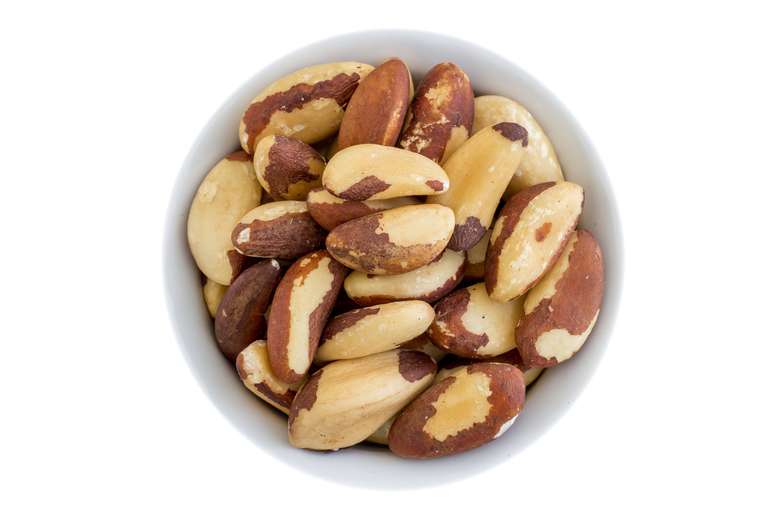A Brazilian study demonstrated the positive impact of food on overweight women
One study explored the positive impact of daily consumption of Brazil nuts on inflammation and gut health, focusing on overweight or obese women.
Brazil nuts are one of the richest sources of selenium, an essential mineral that acts as an antioxidant, improves immune function and thyroid hormone metabolism.
Intestinal permeability
Low levels of selenium in the blood are associated with several inflammatory conditions, including poor gut health. Additionally, previous studies highlight connections between obesity, inflammation and gut problems, such as increased intestinal permeability, a condition that can lead to loosening of the cell junctions lining the intestine.
Leaky gut allows more antigens, toxins, and bacteria to enter the bloodstream, triggering more inflammation and creating a cycle in which obesity and leaky gut worsen each other.
The results of the present study, published in The journal of nutritionsuggest that consuming 8 grams of Brazil nuts per day may improve these health indicators, likely due to their high selenium content.
Overweight or obese participants
The work involved 56 adult women, aged between 20 and 55. Participants were overweight and had specific cardiometabolic risk factors (17.4%) or obesity (82.6%), regardless of risk factors.
Participants consumed organic Brazil nuts sourced from the Amazon and donated by the company Econut over the course of eight weeks.
Researchers from the Department of Nutrition and Health of the Federal University of Viçosa (MG) excluded people who were pregnant, breastfeeding, menopausal, athletes, vegans, with certain medical conditions, who used specific drugs, who presented changes in significant weight. , who consumed nuts regularly or had other potential interferences in the study.
Everyone followed a weight loss diet
They divided the participants into a group that consumed Brazil nuts and a control group that did not consume them. Both received customized menu options that contained approximately 500 calories less than their estimated daily needs.
The macronutrient distribution was 50% carbohydrate, 30% fat, and 20% protein, following established guidelines for obesity management. The goal was for participants to lose at least 4 pounds in 8 weeks.
The researchers analyzed blood inflammatory markers and selenium levels, as well as tested intestinal permeability using the so-called lactulose/mannitol test.
Of the 56 women recruited, 46 (82.1%) were included in the final sample. At baseline, the control group had a higher intake of polyunsaturated fats than the Brazil nut group. During the intervention, the control group reduced their intake of saturated fat, while the Brazil nut group increased their intake of polyunsaturated fat and dietary fiber. Both groups achieved similar calorie restrictions, weight loss (about 3 pounds), and small reductions in waist circumference.
Improves inflammation and gut health
The researchers noted that the group that consumed Brazil nuts showed a significant increase in selenium levels compared to the control group, demonstrating adherence to Brazil nut consumption. Compared to the control group, the Brazil nut group also showed lower values of inflammatory markers, including C-reactive protein, tumor necrosis factor, and the interleukins IL-1β and IL-8, indicating improved systemic inflammation.
In the Brazil nut group, C-reactive protein levels decreased from 7.1 mg/L to 5.6 mg/L at the end of 8 weeks. In contrast, the control group saw an increase from 8.0 to 9.4 mg/L. The mechanism underlying these changes in C-reactive protein levels is not yet clear, but may be related to intestinal permeability and inflammation of the gut. Additionally, women in the Brazil nut group who lost more weight showed more significant reductions in C-reactive protein levels.
The Brazil nut group also showed a slight improvement in gut permeability markers compared to the control group. However, the changes were statistically similar in both groups.
In further analysis, the researchers found that higher levels of selenium in the blood were linked to lower markers of inflammation, specifically IL-1β and IL-8 (IL-8 is also linked to changes in gut permeability).
These findings suggest that selenium levels may predict changes in markers of systemic inflammation and intestinal permeability.
Just one or two a day!
This study had a small sample size and short duration. The study was limited to young and middle-aged women recruited in Brazil, so the findings may not be generalizable to other populations.
Regardless, experts suggest that eating one or two Brazil nuts a day may be a healthy way to ensure adequate selenium levels. It is worth remembering that exaggerating is not good: more than four or five nuts can lead to an excess of the mineral, which is not good for your health.
Source: Terra
Ben Stock is a lifestyle journalist and author at Gossipify. He writes about topics such as health, wellness, travel, food and home decor. He provides practical advice and inspiration to improve well-being, keeps readers up to date with latest lifestyle news and trends, known for his engaging writing style, in-depth analysis and unique perspectives.





![It All Begins Here: What’s in store for Thursday 16 October 2025 Episode 1286 [SPOILERS] It All Begins Here: What’s in store for Thursday 16 October 2025 Episode 1286 [SPOILERS]](https://fr.web.img3.acsta.net/img/7d/99/7d99acbb3327f48a72b40f684092775e.jpg)

-qe1jxfyoo3eh.JPG)

